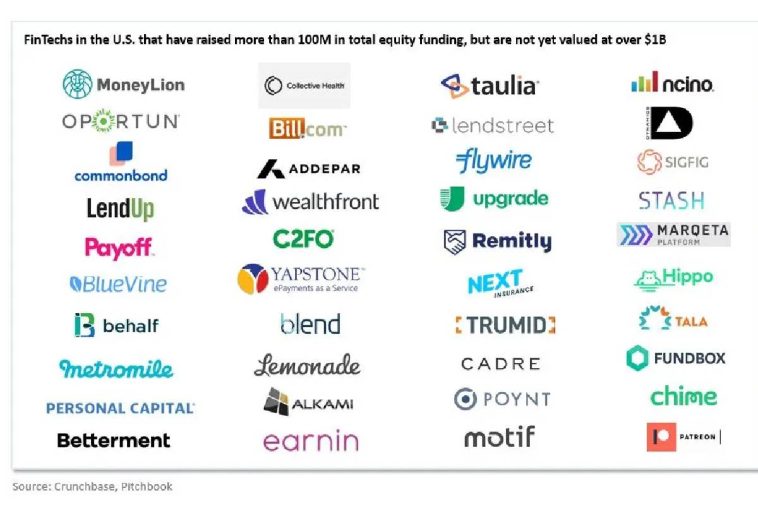Introduction
Fintech Startups – Fintech is a combination of “finance” and “technology.” It refers to using technology to improve and automate financial services. Fintech startups also use technology to provide new or innovative financial services.
The fintech industry has been overgrowing in recent years. It is due to many factors, including the increasing use of mobile devices, the growing demand for online financial services, and the availability of venture capital funding.
Types of Fintech Startups

There are many different types of fintech startups. Some of the most common types include:
- Payment processing startups: These startups provide services that allow businesses and individuals to accept payments online or in person.
- Lending startups: These startups provide loans to businesses and individuals, often using alternative data sources to assess creditworthiness.
- Investment startups: These startups provide investment services to businesses and individuals, often using technology to make investing more accessible and affordable.
- Insurance startups: These startups provide insurance products to businesses and individuals, often using technology to make insurance more efficient and affordable.
- Regtech startups: These startups provide technology solutions to help financial institutions comply with regulations.
Fintech startups are having a significant impact on the financial services industry. They are disrupting traditional financial institutions by providing new and innovative services that are often more convenient, affordable, and efficient.
Fintech startups are also helping to make financial services more accessible to people who the financial system has traditionally underserved. For example, fintech startups provide financial assistance to people in developing countries who do not have access to traditional banking services.
The Rise of Fintech
The fintech industry is still in its early stages of development, and it remains expected to continue to increase in the years to come. Fintech companies are poised to continue to disrupt the financial services industry and make financial services more accessible and affordable to people worldwide.
Here are some of the reasons for the rise of fintech:
- The increasing use of technology: Technology is becoming increasingly universal in our lives, and this is also true for the financial services industry. Fintech companies are using technology to provide new and innovative financial services that are often more convenient, affordable, and efficient than traditional ones.
- The growing demand for online financial services: The internet has enabled people to access financial services anywhere. It has led to an increasing demand for online financial services, which fintech companies are well-positioned to provide.
- The availability of venture capital funding: Venture capital firms are increasingly investing in fintech companies. This funding is helping fintech companies to grow and develop new and innovative financial services.
The rise of fintech is a positive development for the financial services industry. Fintech companies are providing new and innovative financial services that are often more convenient, affordable, and efficient than traditional ones. It is helping to make financial services more accessible to people around the world.
The Future of Fintech
The fintech industry is still in its early stages of development, and it remains expected to increase in the years to come. Fintech startups are poised to continue to disrupt the financial services industry and make financial services more accessible and affordable to people worldwide.
Here are some of the most successful fintech startups:
- Ant Financial: Ant Financial is a Chinese fintech company that provides various financial services, including payments, lending, and insurance. Ant Financial is the world’s largest fintech company by market capitalization.
- Square: Square is an American fintech company that provides payment processing services to businesses and individuals. Square is one of the most popular payment processing companies in the United States.
- PayPal: PayPal is an American fintech company that provides online payment services. PayPal is one of the most popular online payment services in the world.
- Stripe: Stripe is an American fintech company providing businesses with payment processing services. Stripe is one of the most popular payment processing companies for startups.
- Robinhood: Robinhood is an American fintech company that provides commission-free stock trading services. Robinhood is one of the most popular stock trading platforms for millennials.
The Impact of Fintech
Fintech is having a significant impact on the financial services industry. It is disrupting traditional financial institutions by providing new and innovative services that are often more convenient, affordable, and efficient.
Fintech is also helping to make financial services more accessible to people who the financial system has traditionally underserved. For example, fintech companies provide financial assistance to people in developing countries who do not have access to traditional banking services.
The impact of fintech is still being felt, but it is having a positive effect on the financial services industry. Fintech companies are providing new and innovative financial services that are making financial services more accessible and also affordable to people around the world.
Here are some of the ways that fintech is impacting the financial services industry:
- Increased competition: Fintech companies are providing new and innovative financial services that are often more convenient, affordable, and efficient than traditional ones. It is increasing competition in the financial services industry, leading to lower prices and better consumer services.
- Improved customer service: Fintech companies use technology to provide better customer service than traditional financial institutions. For example, fintech companies can provide 24/7 customer support and quickly and efficiently resolve customer issues.
- New financial products and services: Fintech companies are developing new financial products and services that were impossible before. For example, fintech companies provide peer-to-peer lending services, allowing individuals to lend money to each other directly.
- Increased financial inclusion: Fintech companies are making financial services more accessible to people traditionally underserved by the financial system. For example, fintech companies provide mobile banking services to people in developing countries who do not have access to traditional banking services.
Conclusion
Fintech, or financial technology, uses technology to improve and automate financial services. As a result, fintech companies are using Fintech startups are also helping to make financial services more accessible to people who the financial system has traditionally underserved.

